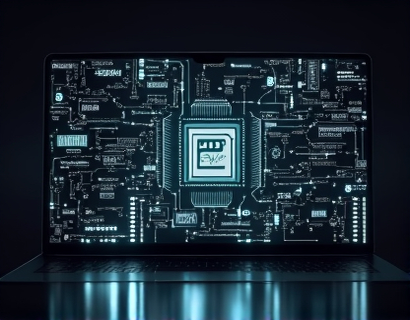Pseudonym Generation for Secure Blockchain and AI Operations: Innovative Software Solutions for Privacy and Compliance
In the rapidly evolving landscape of technology, the need for robust privacy and compliance measures has become paramount, especially in the realms of blockchain and artificial intelligence (AI). As digital transactions and data interactions increase, the importance of maintaining user anonymity and adhering to stringent regulatory standards cannot be overstated. This article delves into the critical role of pseudonym generation and management, focusing on innovative software solutions designed to create and manage secure pseudonyms. These tools are essential for tech-savvy users who seek to ensure privacy, compliance, and seamless integration in their blockchain and AI operations.
Understanding Pseudonymization
Pseudonymization is the process of replacing personally identifiable information (PII) with artificial identifiers, or pseudonyms, to protect individual identities while still allowing data to be used for various purposes. In the context of blockchain and AI, pseudonymization serves as a crucial layer of security and privacy. By using pseudonyms, users can engage in transactions and data exchanges without revealing their true identities, thereby reducing the risk of identity theft and unauthorized data access.
Pseudonyms are not random strings of characters; they are carefully generated to ensure a balance between anonymity and traceability. This balance is vital for maintaining the integrity of blockchain networks and AI systems, where certain levels of traceability are necessary for auditing and compliance purposes. The process involves creating a unique identifier that is linked to a user's actions but does not directly reveal personal information.
Challenges in Blockchain and AI Privacy
Blockchain technology, while renowned for its transparency and immutability, poses significant privacy challenges. The decentralized and public nature of blockchain ledgers means that transactions are visible to anyone, potentially exposing sensitive information. Similarly, AI systems often require vast amounts of data, much of which is personal and sensitive. Ensuring that this data is handled securely and in compliance with regulations like the General Data Protection Regulation (GDPR) is a complex task.
One of the primary challenges is the trade-off between privacy and utility. Blockchain and AI applications need to maintain a certain level of transparency to function effectively, but this transparency can compromise user privacy. Pseudonymization addresses this issue by allowing data to be used for its intended purposes while minimizing the risk of exposing personal identities.
Role of Software Solutions in Pseudonym Generation
To effectively manage pseudonyms in blockchain and AI operations, advanced software solutions are essential. These tools are designed to generate, manage, and revoke pseudonyms securely and efficiently. The software ensures that pseudonyms are unique, difficult to guess, and resistant to reversal engineering, which could compromise the user's identity.
One of the key features of these software solutions is their ability to integrate seamlessly with existing blockchain and AI frameworks. This integration ensures that pseudonymization is a built-in component of the system, rather than an afterthought. By embedding pseudonym generation and management into the core architecture, developers can create more secure and privacy-focused applications.
Key Features of Pseudonym Generation Software
Effective pseudonym generation software must possess several critical features to meet the demands of modern blockchain and AI environments.
1. Secure Pseudonym Generation
The first and foremost requirement is the generation of secure pseudonyms. The software should use cryptographic algorithms to create pseudonyms that are virtually unbreakable. These algorithms ensure that even if an attacker gains access to the pseudonym, they cannot reverse-engineer it to reveal the user's true identity.
Additionally, the software should allow for the customization of pseudonym length and complexity, depending on the specific security requirements of the application. This flexibility ensures that users can tailor the pseudonyms to their needs, balancing security and usability.
2. Pseudonym Management
Managing pseudonyms is as important as generating them. The software should provide a comprehensive dashboard for users to create, view, and manage their pseudonyms. This includes features such as pseudonym rotation, where users can regularly change their pseudonyms to enhance security, and pseudonym linking, which allows users to associate multiple pseudonyms with a single identity for auditing purposes.
Another crucial aspect is the revocation of pseudonyms. In cases where a pseudonym is compromised or no longer needed, the software should enable users to revoke the pseudonym, rendering it unusable and ensuring that it cannot be misused.
3. Compliance and Auditing
Adherence to regulatory standards is a non-negotiable requirement for any blockchain or AI application. The pseudonym generation software must include features that facilitate compliance with regulations such as GDPR, CCPA, and others. This includes logging and reporting mechanisms that track pseudonym usage and ensure that data handling practices meet legal requirements.
Auditing tools are also essential, allowing organizations to conduct regular checks on pseudonym management processes. These tools can help identify potential vulnerabilities and ensure that the system remains secure and compliant over time.
4. Integration and Interoperability
Seamless integration with existing blockchain and AI platforms is a critical feature of pseudonym generation software. The software should support multiple blockchain networks and AI frameworks, ensuring that users can deploy pseudonymization across various environments without significant modifications.
Interoperability is equally important, as it enables different systems to communicate and share pseudonymized data securely. This is particularly relevant in decentralized applications where multiple parties need to interact while maintaining privacy.
Benefits of Using Pseudonym Generation Software
The adoption of pseudonym generation software offers numerous benefits for tech-savvy users and organizations operating in the blockchain and AI spaces.
Enhanced Privacy
Perhaps the most significant benefit is the enhanced privacy it provides. By using pseudonyms, users can engage in blockchain transactions and AI-driven processes without exposing their real identities. This level of anonymity is crucial for individuals and organizations that handle sensitive information and need to protect their privacy.
Compliance with Regulations
Pseudonym generation software helps organizations comply with stringent data protection regulations. By pseudonymizing data, companies can demonstrate their commitment to privacy and data security, which is increasingly important for maintaining customer trust and avoiding legal penalties.
Improved Security
Secure pseudonyms reduce the risk of identity theft and unauthorized access to sensitive data. The use of strong cryptographic algorithms ensures that pseudonyms are robust against attacks, providing an additional layer of security for blockchain and AI operations.
User Trust and Adoption
When users know that their privacy is protected, they are more likely to adopt and trust blockchain and AI applications. Pseudonym generation software can help build this trust by ensuring that user data is handled securely and in compliance with best practices.
Case Studies and Real-World Applications
To illustrate the practical applications of pseudonym generation software, consider a few real-world scenarios.
In the financial sector, a blockchain-based payment platform can use pseudonym generation to allow users to make transactions without revealing their real identities. This approach not only enhances user privacy but also complies with financial regulations that require a certain level of anonymity in transactions.
In the healthcare industry, AI-driven systems can pseudonymize patient data to enable research and analysis while protecting patient privacy. This ensures that medical institutions can leverage AI for better diagnostics and treatment plans without violating privacy laws.
Another example is in the realm of social media, where decentralized platforms can use pseudonyms to allow users to interact and share content without exposing their real identities. This can foster a more open and secure online environment.
Future Trends in Pseudonym Generation
The field of pseudonym generation is rapidly evolving, driven by advancements in blockchain technology, AI, and privacy regulations. Some key trends to watch include:
- Zero-Knowledge Proofs: The integration of zero-knowledge proofs with pseudonym generation can further enhance privacy by allowing users to prove certain statements about their data without revealing the data itself.
- Decentralized Identity Management: As decentralized identity solutions gain traction, pseudonym generation software will need to adapt to manage identities in a decentralized manner, ensuring that users have control over their pseudonyms.
- Regulatory Evolution: As more regions introduce privacy regulations, pseudonym generation software will need to stay ahead of these changes, ensuring compliance with new and evolving standards.
These trends indicate a future where pseudonym generation will become even more sophisticated, providing even greater privacy and security for users in the digital age.
Conclusion
Pseudonym generation is a critical component of secure blockchain and AI operations, offering a balance between privacy, compliance, and functionality. By leveraging advanced software solutions, users and organizations can create and manage secure pseudonyms, ensuring that their digital activities remain private and compliant with regulatory requirements. As technology continues to advance, the importance of pseudonymization will only grow, making it an essential tool for anyone involved in blockchain and AI.










































